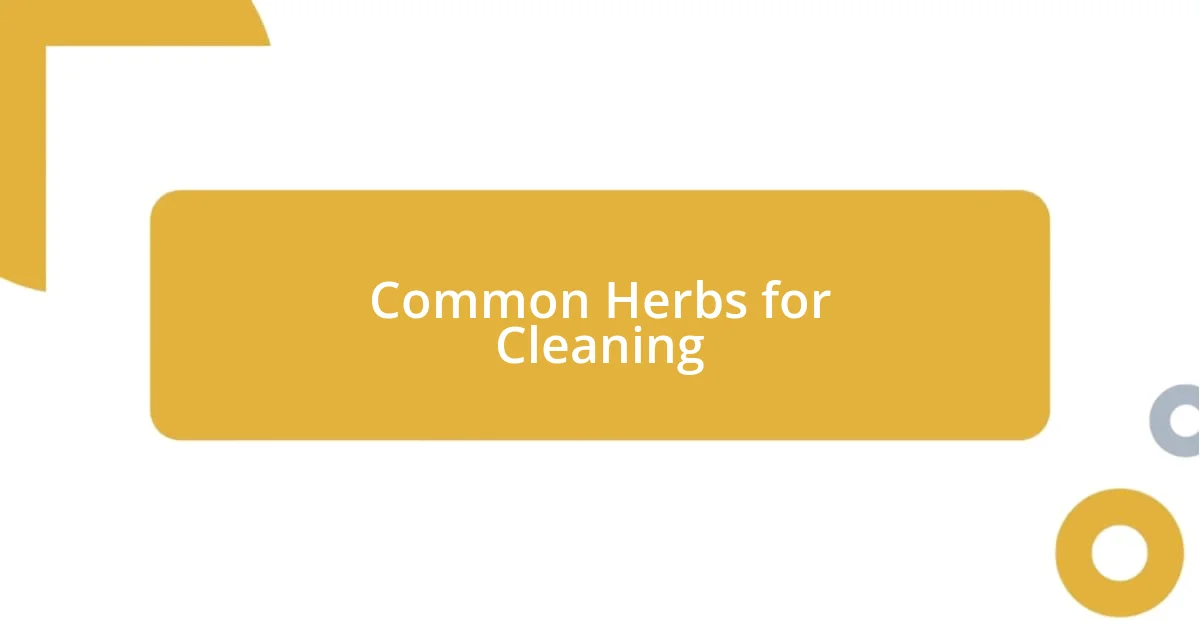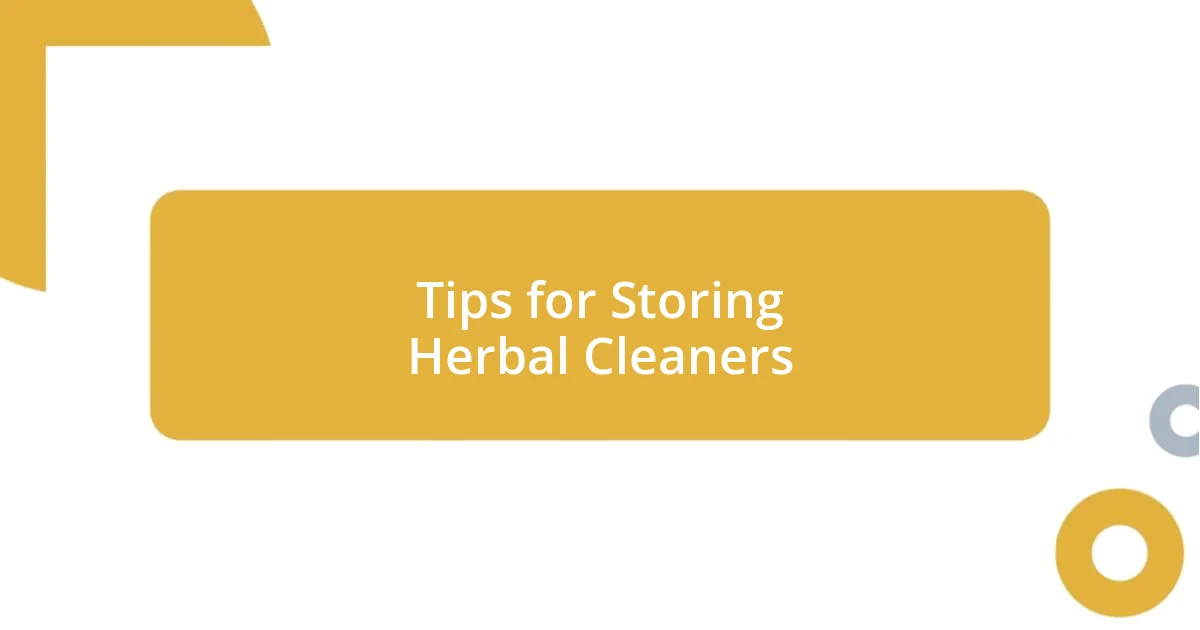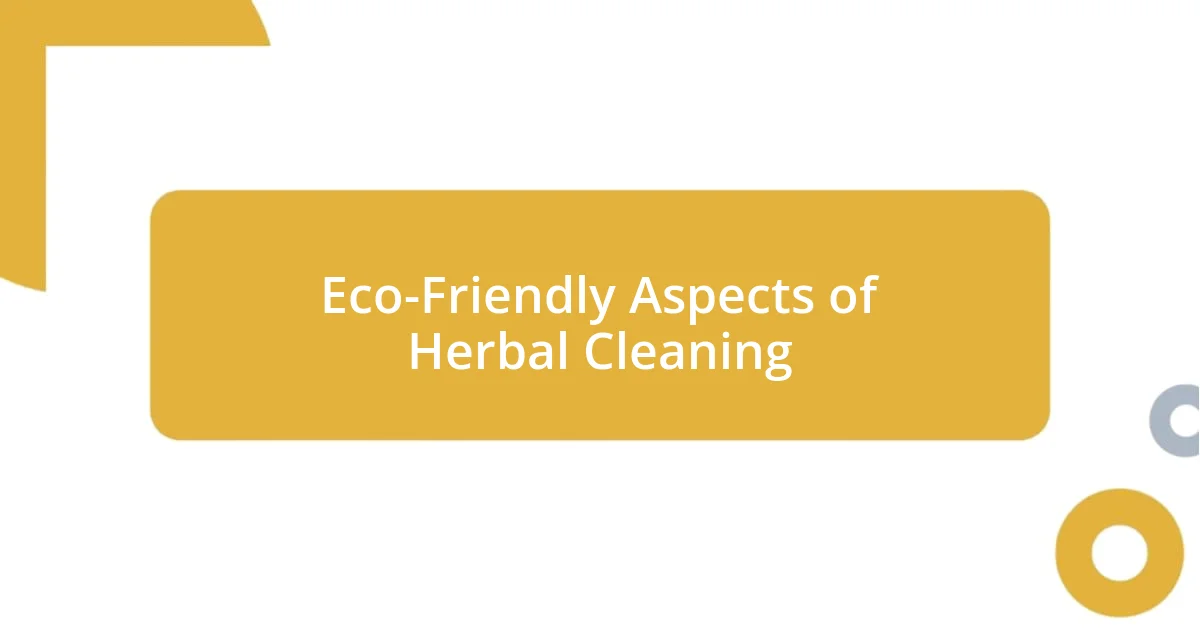Key takeaways:
- Cleaning with herbs provides natural fragrances, antibacterial properties, and environmentally friendly alternatives to synthetic cleaners.
- Common herbs like thyme, lavender, and rosemary can be used effectively for cleaning through techniques such as infusions, herbal sprays, and scrubs.
- Proper storage, allergy awareness, and surface compatibility are crucial for safe and effective use of herbal cleaning solutions.

Benefits of Cleaning with Herbs
One of the most delightful benefits of cleaning with herbs is the natural fragrance they offer. I remember the first time I used fresh lavender to wipe down my kitchen counters; the entire room transformed into an oasis of calm. Don’t you agree that a pleasant scent can make a task feel much less like a chore?
Herbs are also fantastic for their antibacterial properties. I often reach for thyme when I need to tackle stubborn kitchen surfaces. It’s remarkable how nature provides such potent cleaning agents without the harsh chemicals found in many commercial products. Have you ever considered how much more reassuring it feels to use ingredients you’d find in your own garden rather than something with an unpronounceable label?
Another aspect I treasure about cleaning with herbs is their environmentally friendly nature. Using herbs means I’m not just cleaning my space but also contributing to a healthier planet. It’s a small change, but it gives me a sense of doing something positive. How empowering is it to know that every time I choose herbs over synthetic cleaners, I’m making a choice for sustainability?

Common Herbs for Cleaning
When it comes to common herbs that are effective for cleaning, a few stand out in my mind. For instance, I’ve found that rosemary not only has a lovely smell, but its antiseptic properties are excellent for disinfecting surfaces. The first time I made a rosemary-infused cleaner, I was blown away by how much brighter my countertops looked. Plus, every time I catch a whiff of that fresh scent, it brings back memories of my grandmother’s garden, adding a personal touch to my cleaning ritual.
Here’s a quick list of some common herbs you can use for cleaning:
- Thyme: Great for tackling tough stains due to its antibacterial properties.
- Lavender: Offers a calming scent while effectively disinfecting.
- Mint: Provides a refreshing aroma and helps repel insects.
- Sage: Known for its purifying effects and great for smoke odors.
- Rosemary: A natural antiseptic that leaves behind a delightful fragrance.
Using these herbs not only freshens my home but also enhances my mood. I genuinely look forward to cleaning days now; it feels more like a self-care practice than a chore.

Effective Techniques for Herbal Cleaning
When it comes to effective techniques for herbal cleaning, I’ve found that simple infusions can make a big difference. For example, I love to steep fresh mint in hot water, let it cool, and use that as a refreshing cleaner for my countertops. The invigorating scent not only brightens my kitchen but also keeps pesky ants at bay—it’s like a two-for-one solution that I can whip up in no time.
Another technique I’ve adopted is creating herbal sprays. A blend of vinegar with rosemary extends the cleaning power and leaves behind a long-lasting aroma that just feels clean. I distinctly remember spraying it on my windows for the first time; the shine was amazing and the light scent lingered for hours. Have you ever experienced that delightful moment of cleaning when the air just feels fresher? It’s quite satisfying!
Lastly, I sometimes make cleaning scrubs with dried herbs mixed into baking soda. The texture helps with scrubbing while the scent adds an aromatic touch. Personally, using a basil scrub on my sink has transformed the chore into an empowering experience. The feeling of getting rid of grime while surrounded by that delightful herbaceous scent is truly wonderful.
| Technique | Description |
|---|---|
| Infusions | Steeping herbs in hot water to create a natural cleaner, like mint-infused rinse for surfaces. |
| Herbal Sprays | Combining vinegar and herbs, such as rosemary, to create a fragrant cleaning spray that disinfects. |
| Herbal Scrubs | Mixing dried herbs with baking soda for a scrubbing combination that cleans and freshens at the same time. |

Tips for Storing Herbal Cleaners
When it comes to storing my herbal cleaners, I’ve learned that the right containers make all the difference. Opting for dark glass bottles not only preserves the potency of the herbs but also protects them from light degradation. I can vividly recall the first time I made a lavender-infused cleaner; storing it in a clear bottle resulted in a faded aroma within weeks. Now, I make sure to use amber bottles, which keep my creations powerful and fragrant longer.
Temperature also plays a crucial role in preserving my herbal cleaners. I try to keep them in a cool, dark place, like a pantry or cabinet. I remember once leaving a mint spray near the stove, and the heat rendered it almost useless. Now, I have designated spots for my herbal cleaners, ensuring their effectiveness when I need them.
Lastly, labeling is vital for my herbal concoctions. I use cheerful labels to not only categorize what’s inside but also to remind me of the benefits and the lovely scents associated with each mixture. Each time I reach for a bottle, it feels like a little adventure into my herbal journey. Don’t you find that having everything organized makes the cleaning process more enjoyable? It certainly elevates my mood!

Safety Considerations for Herbal Cleaning
When using herbs for cleaning, it’s essential to consider any allergies you might have. I once made a rosemary spray, and to my surprise, I sneezed uncontrollably for hours afterward. Now, I always check if anyone in my household is sensitive to certain herbs before whipping up a new cleaner. Have you ever had a similar experience that made you rethink your cleaning products?
Another safety consideration is the concentration of essential oils if you choose to use them. While I adore the intense scent of tea tree oil, using too much can lead to skin irritation. I recall a time when I mistakenly added a few too many drops into my cleaning solution and ended up with a rash on my hands. Learning to use essential oils in moderation has made my cleaning routines both safer and more enjoyable.
Finally, keep in mind that some herbal cleaners can react with certain surfaces. For example, my first attempt at using lemon juice on marble left me with dull spots, and I remember feeling frustrated. Now, I always research the specific surface materials in my home to ensure that the lovely herbal cleaners I create don’t harm my cherished spaces. It’s a crucial step that saves frustration and money, wouldn’t you agree?

Eco-Friendly Aspects of Herbal Cleaning
Herbal cleaning solutions bring a wonderful blend of effectiveness and eco-friendliness. One of my most cherished moments was when I realized that not only do these cleaners work wonders, but they also contribute to reducing pollution. Each time I mix up a batch of vinegar and rosemary, I feel good knowing I’m avoiding harsh chemicals that could harm both my family and the planet. Doesn’t it feel lovely to clean your home and protect the environment simultaneously?
I find that using herbs also encourages me to be sustainable in how I source my ingredients. Whenever I pluck fresh mint or basil from my backyard garden, it gives me an incredible sense of fulfillment. The whole process—from planting to cleaning—feels like a nurturing cycle that respects nature. Have you tried growing your own cleaning herbs? It transforms the simple act of cleaning into a delightful connection with the earth.
Additionally, herbal cleaning aligns with the increasing consumer demand for green products. I remember the thrill of discovering brands that used herbal formulas instead of toxic chemicals—there’s a certain comfort in knowing I’m purchasing eco-friendly items that care for our planet. Choosing herbal cleaners isn’t just about cleaning; it’s an affirmation of values that prioritize sustainability and health. How empowering is it to know our everyday choices can lead to a greener future?















